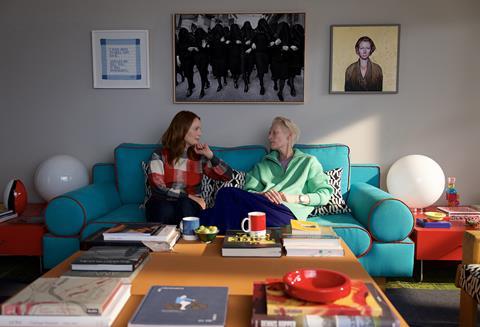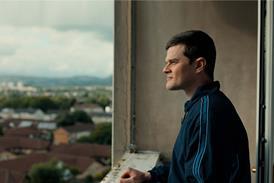Pedro Almodóvar’s Golden Lion winner is also his English-language debut starring Tilda Swinton and Julianne Moore

Dir. Pedro Almodóvar. Spain 2024. 107mins
If you wanted to give an example of the auteur film as Late Period Contemplation, there would be few better examples than Pedro Almodóvar’s Venice Golden Lion winner The Room Next Door. The Man from La Mancha has, in recent work, mused amply on mortality, memory and regret, notably in Julieta and Pain And Glory – and his new feature has striking parallels with those, thematically and formally. But, for a story which ponders on late-life exhaustion and loss of curiosity and pleasure, The Room Next Door strikes a defiant blow against ennui, staking out new territory for the director.
Almodovar has managed to leave his linguistic comfort zone while remaining entirely, inimitably himself
After years of tantalising near-misses, the director’s first English-language feature is both a massive advance on his dud cod-Western short Strange Way Of Life and a 100% Almodovarian film, language notwithstanding. A study of friendship and complicity in the face of illness, it features a superbly matched duo of Tilda Swinton and Julianne Moore, both on authoritative and moving form, while the director’s formal and visual meticulousness is as finely honed as always – even if perilously verging on lifestyle chic.
Solemnity of theme and execution, as well as an erudite literary sensibility, will attract an older niche audience, but it certainly deserves attention as one of the director’s more searching ventures. Sony Pictures Classics is planning an awards season run in the US from December 20, while Warner Bros will release in Spain and key international territories including the UK.
Set in the US, and based on a novel by American writer Sigrid Nunez, it starts at a bookshop where author Ingrid (Moore) is signing copies of her new work, a cogitation on death. Hearing that her old friend, war reporter Martha (Swinton), is terminally ill, Ingrid visits her in hospital and the two women renew old bonds. Martha tells Ingrid about her past in a series of interpolated flashbacks, involving her teen years, her estranged daughter and a visit to Iraq – the latter awkwardly integrating with the rest. It is when Martha asks Ingrid to help her face her impending death that the meaning of the title emerges: when Martha goes, she wants Ingrid to be there, literally and figuratively, in the room next door.
The drama involves a particular challenge for its leads: while Swinton’s character is the one that crisis affects directly, Moore’s role would appear to be one that involves complicity, an ability to listen quietly and to show compassionate empathy. The two stars develop a ying-yang rapport – cool restraint, with flurries of frustration and anger in Swinton’s performance, and a tender, philosophical warmth from Moore. The two play off each other with a closeness that echoes (at some moments explicitly) the dynamics of Ingmar Bergman’s female duos.
Alessandro Nivola makes a brief appearance as a cop with a more judgmental take on life than the other characters. And John Turturro, in an engaging role as the ex-lover of both women, communicates troubled stress as a man profoundly, even hopelessly worried about the state of the planet. His role, however, is one of the film’s less convincing elements, an awkward reminder of the new social responsibility that has become part of Almodóvar’s late mode (as in Parallel Mothers’ earnest address of the Spanish Civil War).
Mortality has rarely looked so very elegant on screen, and the stylistic polish here may strike some as improper or diminishing of the film’s theme. That would be a somewhat puritanical view, although one might baulk at the profligacy with which the director scatters literary, filmic and artistic references throughout – notably to The Dead (both James Joyce’s story and the John Huston screen adaptation) and an outrageous, casual wink at Andrew Wyeth’s painting ‘Christina’s World’. But, given that this is a story about the way that, in late life, people may lose their appetites for art, pleasure and the world, the density of allusiveness here represents a boisterous resistance to the dying of the light.
Finding fresh variants on a familiar Almodóvar house style, new production designer Inbal Weinberg channels, among other elements, the colour palette of painter Edward Hopper. With Eduard Grau’s camerawork highlighting a very manifest geometric precision (one leitmotif is a certain abstract composition of shapes and colours in a doorway), this is one of the director’s most eloquently meticulous works, the perfectionist artifice only serving to amplify the film’s emotional charge by framing it so rigorously. A gently austere score by Almodóvar regular Alberto Iglesias adds meditative echoes of Mahleresque or Strauss.
Where the film will eventually stand in Almodóvar’s canon remains to be seen, but it is a substantial achievement from a director who has managed to leave his linguistic comfort zone while remaining entirely, inimitably himself.
Production company: El Deseo
International sales: El Deseo, eldeseo@eldeseo.es
Producers: Agustin Almodóvar, Esther Garcia
Screenplay: Pedro Almodóvar, based on the novel What Are You Going Through by Sigrid Nunez
Cinematography: Eduard Grau
Production design: Inbal Weinberg
Editor: Teresa Font
Music: Alberto Iglesias
Main cast: Tilda Swinton, Julianne Moore, John Turturro, Alessandro Nivola















![[Clockwise from top left]: Paul Thomas Anderson, Chloe Zhao, Ryan Coogler, Park Chan-wook](https://d1nslcd7m2225b.cloudfront.net/Pictures/274x183/9/0/0/1467900_writerdirectors_192733.jpg)







